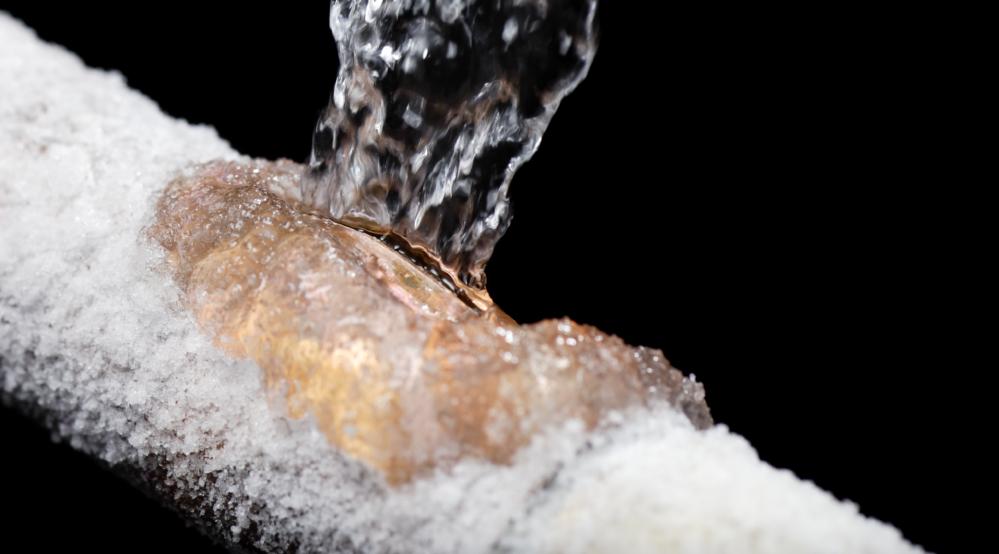
Frozen pipes
Why Pipe Freezing is a Problem
If you have ever put a full container of liquid in your freezer and had it make a giant mess, you know that water expands when it freezes. This expanding force is so strong that even metal pipes can burst if the water inside them freezes. You may not even notice your pipe or pipes have burst until they begin to thaw and water starts to go everywhere. Water accumulating in your home from a burst pipe is exactly the same as from a flood, and equally damaging. Ruined carpet, moldy walls, buckled hardwood floors, and sagging insulation are among the damages you can expect from a burst pipe.
The pipes that are the most likely to freeze are the ones that are most exposed to cold weather. Outdoor hose bibs, lawn sprinkler lines, pool or hot tub lines, and water supply lines in unheated places like crawl spaces, attics, and garages. Pipes in exterior walls are more likely to freeze if insulated poorly than pipes in interior walls.
How To Prevent Frozen Pipes
Before Cold Weather Starts
The best time to prevent frozen pipes is in Autumn before the weather gets cold. By following our recommended guidelines, many of which only need to be done once, you will be ahead of the game when Old Man Winter comes calling.
Drain all water from pool and/or spa supply and drain lines if possible. Same with any sprinkler lines. Empty lines need no antifreeze. Any of the above mentioned lines and drains that cannot be emptied must have antifreeze added according to the manufactures instructions. Remove your water hoses and store inside if possible. Place a removable insulating cover over your exterior hose bibs. These can be purchased at your local home improvement store for just a few dollars each.
Make sure that any exposed pipe in unheated areas of your home, such as above the insulation in the attic, below the insulation in your crawl space, your garage, etc, are either insulated with pipe insulation, or wrapped with heat-trace wire. Both can be do-it-yourself projects for the savvy home owner. Both items can purchased from your local home improvement store.
Use only insulation designed for water pipes. An old home remedy was to insulate pipes with old newspapers. We do NOT recommend insulating with newspaper as that can be a huge fire hazard!
When Cold Weather Hits
Now that your home has been properly prepared, your plumbing will be more able to resist the cold weather. However, there are a few things you can do during the cold weather to help even more.
If you have exposed pipes in the garage, keep the garage door closed as much as possible. You may even need to place a heat lamp in the vicinity of the piping. Do the same for your crawl space. Make sure any openings are closed. Open the kitchen and bathroom cabinet doors so that the heat in your home can easily reach your
If you would typically turn down your home thermostat overnight, consider suspending this until warmer weather arrives. A warmer home equals warmer pipes.
If you will be leaving your home for an extending period of time you should leave your thermostat set no lower than 60 degrees. Leave a faucet running at a slow trickle during the bitterest cold weather. Moving water doesn't freeze as easily. We recommend selecting the faucet farthest from where the water service enters your home. Yes, the running water will increase your water bill slightly, but a frozen pipe flood can cost you tens of thousands of dollars in home repairs!
I Have A Frozen Pipe, Now What?
Sometimes a pipe can freeze and you won't know about it until it thaws out. A pipe can even freeze and burst and still not leak until the thaw. But sometimes, depending on where the freeze is located, you will notice a marked reduction in water pressure. When this happens, you might be able to thaw out the line before it bursts. If you find yourself in this position, here are our recommend steps.
- Open all of the indoor faucets. If water is still able to trickle through the pipe it will help to thaw the ice due to the incoming water being warmer than the clogging ice.
- If you can locate the place where the pipe is frozen, and it's not always possible, you can attempt to thaw it with an electric heating pad or a heat lamp, but only if there is no water present. Never use any electrical appliance if the pipe has already burst, or if water is present, as you run the risk of being electrocuted!
- If the pipe is in an area where you don't mind making a mess, pouring hot water over the pipe will also work.
- Do not attempt to thaw a frozen pipe with any open flame, like a torch. The risk of starting a fire is too great.
- If you are successful at thawing the pipe, immediately take the steps mentioned in this article to prevent it from happening again an hour later.
- If you can not thaw the pipe, call us before it bursts and possibly causes a lot of expensive damage!
As always, we would love to help you get your home ready for cold weather. Remember, preventive maintenance like pipe insulation and/or heat trace will only need to be installed once and will protect your home for years to come. If you are reading this because you already have a frozen pipe, or worse, a pipe that has burst, give us a call. We'll make all of the necessary repairs for you and even suggest ways to prevent it from happening again in the future!
Give us a call today!